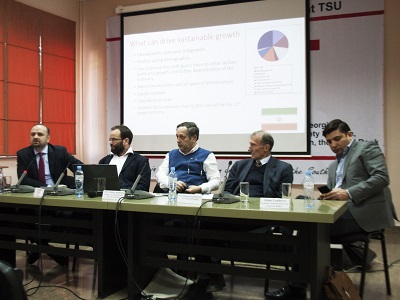The recent resetting of Georgian-Iranian bilateral relations was in the focus of a seminar organized by ISET and the Austrian Institute for Caucasus Studies as part of the Vienna Forum for the Modernization of the Black Sea Region. Held on Tuesday, March 22nd, the seminar covered both historical and current – political and economic – aspects of cooperation between the two countries. The expert panel included Professor Hans-Georg Heinrich, Austrian Institute for Caucasus Studies; Prof. George Sanikidze, Director of the Institute of Oriental Studies at Ilia State University; Iva Khokhlov, Ernst & Young-Georgia; and ISET President Eric Livny, who also moderated the discussion.
Speakers focused on the opportunities related to Georgia’s reopening towards Iran’s investment and tourism. Georgia can offer Iran several important advantages: easier access to the EU market and infrastructure connecting Iran to the Black Sea region: sea ports, rail and road, pipelines and fiber optic. Georgia should certainly expect a sharp increase in the number of Iranian tourists following the lifting of the visa requirement for Iranian visitors. Whether or not this would be followed by foreign direct investment from Iran will depend on the quality of Georgia’s business environment, its openness to qualified Iranian labor, and access to agricultural land.
Among factors potentially hindering Iranian investment in Georgia may be competition with Turkey, Iran’s long-time rival in the South Caucasus regions, Iran’s desire to serve as a neutral broker in the geopolitical conflict between Russia and the West, as well as security threats related to tensions between Iran and Israel (a strong Georgian ally) on the one hand, and Georgia and Russia, on the other. Summarizing the discussion, Mr. Livny suggested that with the sanctions lifted, Iran’s interest in Georgia may be not as strong as it used to be back in 2010-2013, when Georgia was one of the few places Iranians could visit and do business with. The abrupt manner in which Georgia had unilaterally severed its ties with Iran in July 2013 may have left many potential Iranian investors with somewhat of a bitter taste in their mouths.











